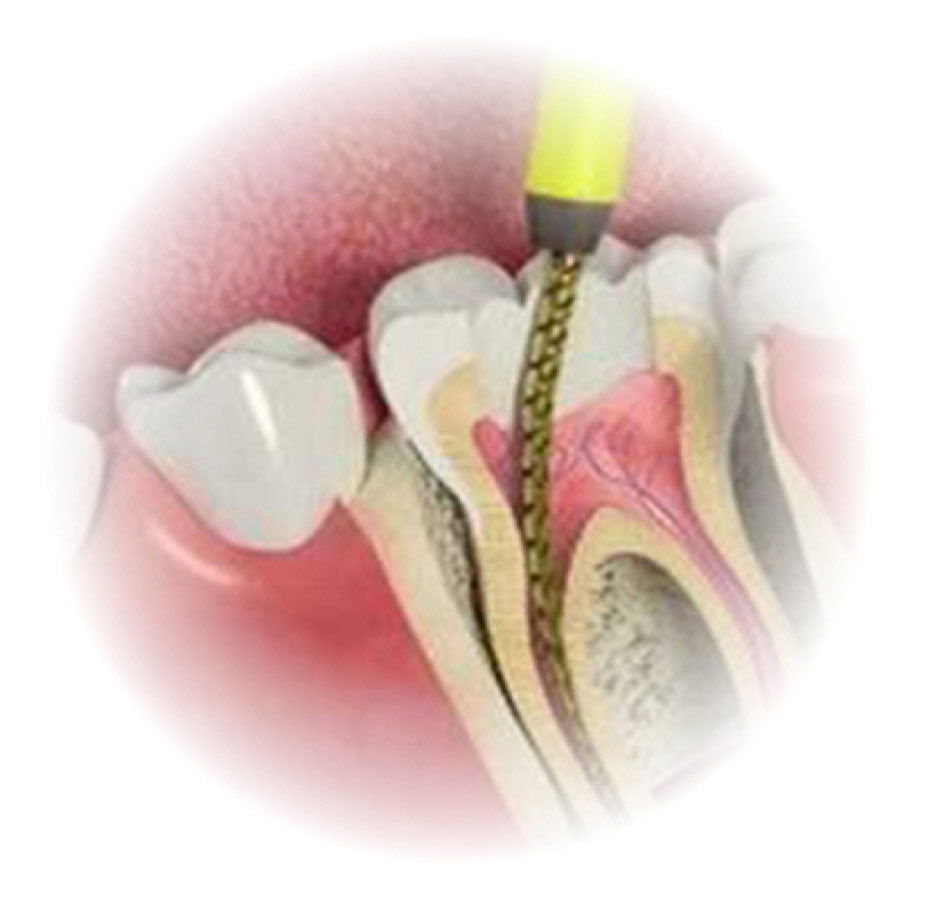Root Canal Treatments in Jenkintown, PA
If you have a badly decayed or infected tooth, come to New Age Dental in Jenkintown for a root canal treatment. We offer top-quality dental care in the Philadelphia area for this and other dental procedures.

What is a Root Canal?
A root canal treatment is a procedure sequence for the infected pulp of a tooth which results in the elimination of infection and the protection of the decontaminated tooth from future microbial invasion. In other words, this treatment is used to repair and save a tooth that is badly decayed or becomes infected.
During a root canal, the surgeon removes the tooth’s nerves and pulp (the critical inner parts of the tooth containing blood vessels and connective tissue), and then cleans the wound and seals it back up.
Don’t worry: your teeth’s nerves aren’t needed for much once your tooth has grown in. It detects sensations such as hot and cold, similar to other nerves in your body, the only difference being those nerves keep you out of danger. A missing tooth nerve won’t be very noticeable in your daily life.
How Do Teeth Nerves and Pulp Become Damage?
Your teeth nerves and pulp can become inflamed, irritated and even infected several ways:
- Untreated dental decay
-
Excessive or repetitive dental work
-
Facial trauma – such as getting hit in the face playing sports
These can cause the nerve and pulp to break down, leading to many problems.
Why Should Someone Get a Root Canal Treatment to Remove Nerves and Pulp?
Damaged tooth nerves and pulp can break down within the tooth, allowing bacteria to multiply in the space that the nerves and pulp occupy.
When left untreated, the bacteria can cause the tooth to decay and even create infections in the tooth and its surrounding tissue, creating abscesses. When left untreated, a tooth infection can spread down the root and cause bone loss in the jawbone.
The problem can become even worse as the infection spreads to other areas on your face, neck and head.
Removing the tooth nerves and pulp early on is critical to preventing such as severe infection.
Are Root Canals Painful?
Root canals are almost always associated with pain. However, the procedure itself is not painful at all when the area around the tooth is under anesthesia.
Tooth infections, however, are painful. Infected teeth can ache pretty severely. Also, infected teeth can cause sensitivity to hot, cold, pressure and can even cause tenderness in areas around the mouth.
How Does a Root Canal Work?
Root canals require several office visits with either a general dentist or an Endodontist, which is a type of dentist who specializes in everything about tooth nerves and pulp.
First, you get an x-ray so the dentist can observe root canal structure and spot signs of infection in bones around the tooth.
Immediately before the procedure, dentists generally anesthetize the area around the tooth to reduce discomfort. The area being operated on needs to be dry, so the dentist will place a rubber dam (a sheet of rubber) around the tooth to keep out saliva.
From there, removal is quite simple: the dentist drills a hole into the tooth to access the root canal within and removes the damaged nerves and pulp.
The dentist then cleans the root canal with a series of root canal files used to scrape any other damaged tissue or foreign particles out off the sides of the root canal before rinsing out the root canal to wash away any stubborn debris.
Finally, the dentist seals the tooth, usually the same day. However, some circumstances might necessitate a separate visit. For example, if the tooth is infected, the dentist may want to clean out the root canal with medication before sealing it up.
In this case, they’ll give you a temporary filling to keep the inner teeth clean while the medication does its work.
Root Canals in the Philadelphia Area
Tooth infections left untreated can cause terrible, irreversible damage to your teeth, mouth and potentially even your face, head and general health. Root canals might be uncomfortable or a scary prospect, but the alternative is much worse.
If you’ve experienced persistent toothaches, unusual tooth sensitivity to certain sensations, unexplained swelling in your face, or other infection symptoms, you might need a root canal. Schedule an appointment to our Jenkintown, PA office if you’re looking for the best in root canal treatments..